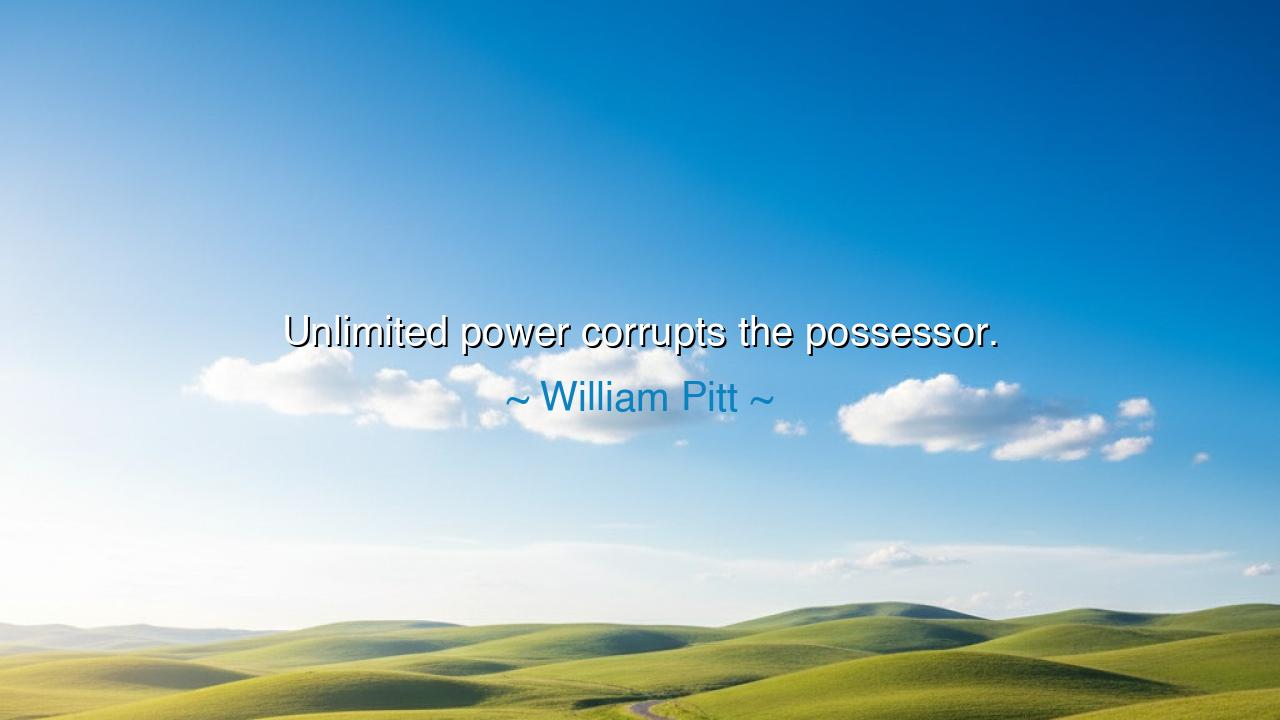
Unlimited power corrupts the possessor.






There is no force more dangerous to the human soul than unlimited power. When William Pitt, the British statesman, declared, “Unlimited power corrupts the possessor,” he spoke of a truth as ancient as civilization itself. Power is like a blazing fire: when contained, it brings warmth and light, but when unbound, it consumes everything, including the one who wields it. Pitt’s words warn that even the noblest of hearts can be poisoned when no boundaries exist to restrain their authority.
Power feeds upon the human spirit, whispering lies of invincibility and divine right. At first, it may be used for noble purposes—to defend the weak, to build cities, to bring order from chaos. Yet as it grows unchecked, power begins to twist the intentions of its possessor. Compassion gives way to pride, justice to ambition, and service to tyranny. Thus, corruption does not come suddenly, but gradually, as the bearer of power forgets their duty and begins to see themselves as above the very laws they were sworn to uphold.
History provides countless examples of this descent. Consider Julius Caesar, who rose from a servant of the Roman Republic to a figure who sought to place all authority in his own hands. At first, his actions brought stability to a fractured state, but as his power grew without limit, so did his arrogance. Fearing his ambition, the Senate struck him down, plunging Rome into civil war. His fate was a dire lesson: the Republic fell not because it lacked strength, but because no mortal was meant to hold unchecked dominion.
Another tragic example lies in the reign of Louis XIV of France, the so-called Sun King. Declaring, “I am the state,” he epitomized the danger of unlimited power. While his grandeur dazzled Europe, his extravagance and absolute rule sowed seeds of resentment that would one day erupt in the French Revolution. Here, Pitt’s words resound clearly: the corruption of one ruler’s soul can lead to the destruction of an entire nation.
Let this teaching be carried to future generations: power must always be bound by law, virtue, and the voice of the people. Even the wisest ruler is but human and can fall to temptation when given too much control. To preserve freedom and justice, societies must build systems that divide power, ensuring that no one hand holds the fate of all. For when unlimited power is granted, it will not merely destroy kingdoms—it will destroy the very soul of the one who wields it. In this truth lies the eternal safeguard of liberty.






RMran mori
I find this both intuitive and frightening. It raises questions about human psychology: why does power tend to distort judgment and ethics? Is it arrogance, isolation, or the freedom to act without consequence? I also wonder whether modern systems can genuinely limit the corrupting potential of power, or if history is destined to repeat itself. Could cultivating humility, accountability, and empathy serve as buffers, or is corruption inevitable once influence exceeds certain thresholds?
MNNguyen Thi Minh Ngoc
This statement makes me think critically about leadership and responsibility. If unchecked power inevitably corrupts, what does that say about historical figures who shaped nations or empires? Could it be that absolute authority amplifies personal flaws rather than creating them? I also wonder how this applies beyond politics—does the same principle affect corporate leaders, tech moguls, or anyone with extraordinary influence? It seems like a warning that spans all domains.
KODuong Kim Oanh
Reading this, I feel a sense of caution and reflection. It suggests that the more control one has, the harder it becomes to resist ethical compromise. Does this mean that true accountability is only possible in distributed systems of governance? I’m curious whether unlimited power always leads to corruption immediately, or if it’s a gradual erosion of judgment. How do personal character and external pressures interact in this process?
Q922.nguyen thi Kim quyen 9a4
This idea feels both timeless and alarming. It makes me wonder if the problem lies in power itself or in human nature. Are there examples of people who held immense authority yet remained morally grounded, or is corruption inevitable? I also question the societal structures that allow power to become unlimited. Could stronger institutions, checks and balances, or cultural norms prevent the descent into corruption, or is it an intrinsic risk of absolute authority?